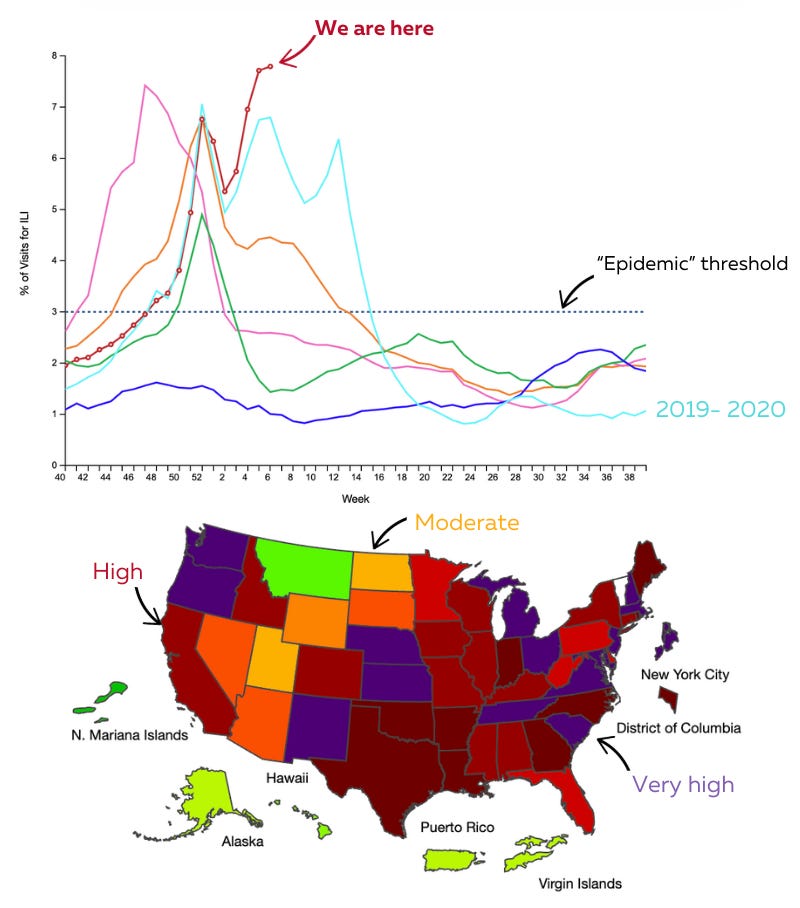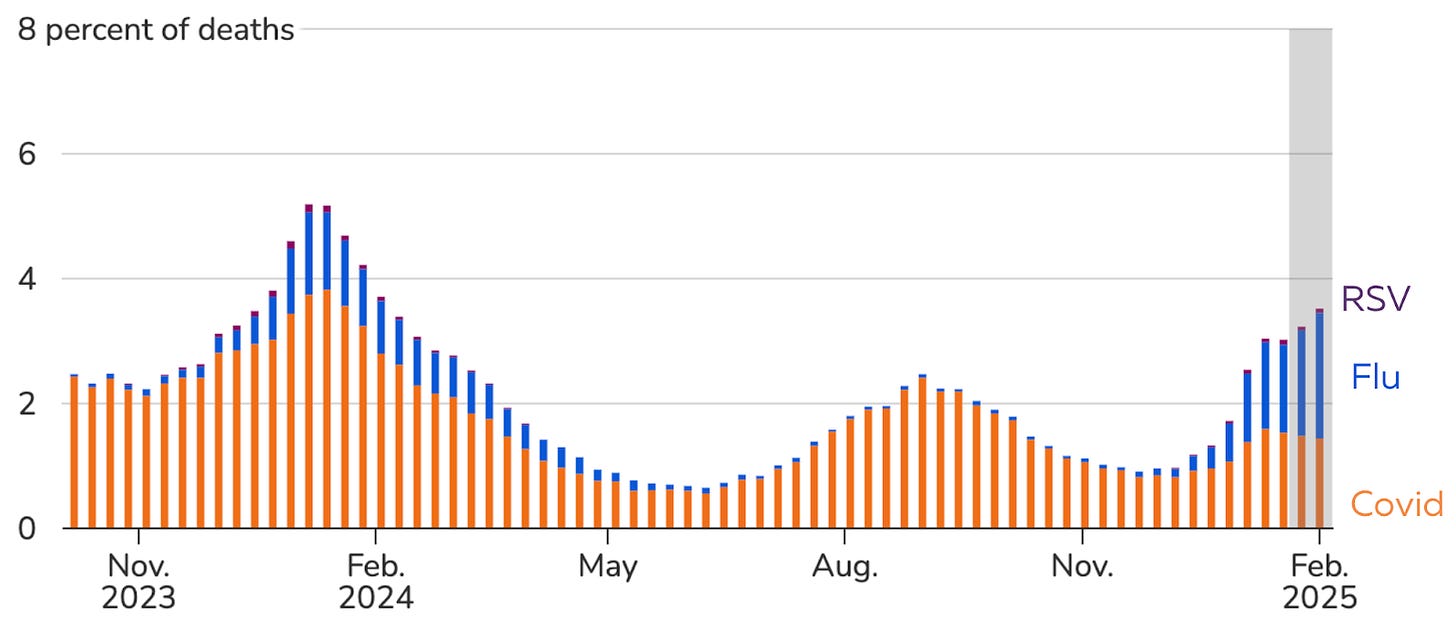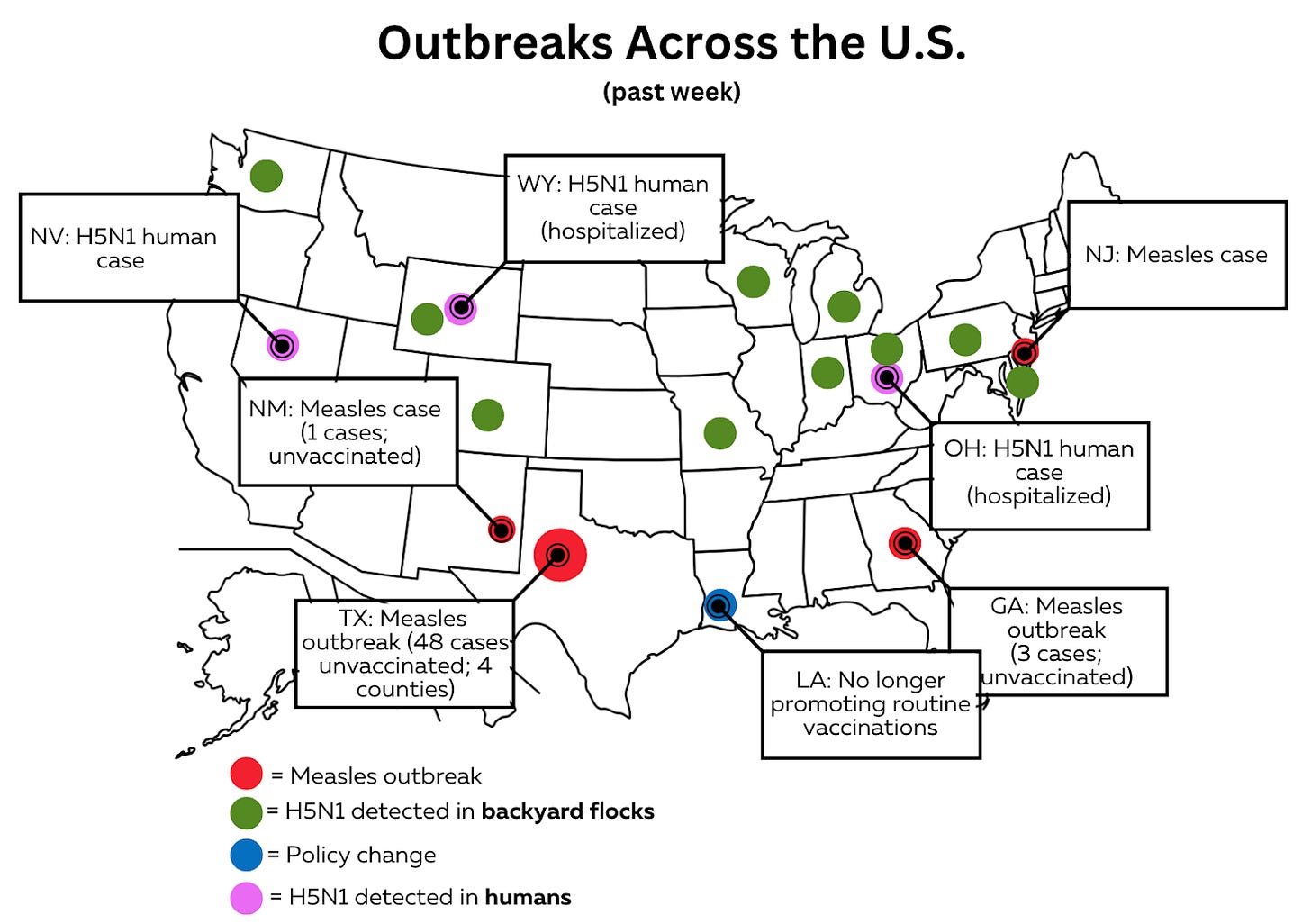Flu breaking records, measles, tuna recall, and federal workers fired
The Dose (February 17)
It’s Monday. Time for another week (breathe in and breathe out). But first, here’s some public health news you can use, including tips on effectively engaging with your state leaders.
Webinar tomorrow
With the news of RFK Jr., the line between falsehoods and truth, especially around vaccines, has never been more blurred. The upcoming months and years will take something from all of us.
On Tuesday (Feb. 18) at 10 a.m. PT/1 p.m. ET, YLE will host a paid subscribers webinar titled Navigating Vaccine Conversations: Practical Strategies in a Changing Landscape. Katelyn Jetelina (YLE) will be joined by Drs. David Higgins and Kristen Panthagani—both physicians and excellent communicators. The goal is to equip you with tools that will surely need to be used today and in the years to come, both by talking with people directly and by approaching vaccine conversations online.
Paid subscribers register here!
Your national disease report: Hello, flu.
There are a lot of sick people out there… still. “Influenza-like illnesses” (defined as a fever, cough, or runny nose) have now reached heights we haven’t seen since the 1990s.
The main culprit is flu, which seems to have peaked but can always rebound. Flu usually gives us a rollercoaster because of the changing weather, different strains receding, and others taking over.
Regardless, flu hospitalization rates are higher so far this season than at the same time during each of the past 15 years. And, interestingly, this is the first winter that flu deaths passed Covid-19 deaths.
There’s a lot we can do about flu—it’s not too late to get the vaccine, as flu season typically has a long tail. Masks and ventilation/filtration help prevent spread. Tamiflu can also help once you do have symptoms, but it needs to be taken within 48 hours.
Many other infectious diseases are also popping up across the country, like measles and two severe human cases of H5N1. Here’s what we’ve seen in the past week:
The Texas measles outbreak has doubled in size to 48 cases, including 13 hospitalizations mostly among kids. None were vaccinated, and the majority of cases are in Gaines County. Note: if you’re in a high-risk area, children can get an MMR vaccine as young as 6 months old (instead of waiting until 12 months).
Next door in New Mexico, a measles case was reported in Lea County—which borders Gaines County, Texas. However, this case didn’t travel, so whether it’s linked to the Texas outbreak is unclear.
On the other side of Texas, the Louisiana Department of Health stopped promoting routine vaccinations by banning vaccine events and ordering staff not to promote vaccinations. This came on the same day that RFK Jr. was confirmed as HHS Secretary.
Food recalls: Botulism in tuna
Canned tuna sold at Trader Joe’s, Costco, and H-E-B is recalled for risk of botulism—a potentially fatal form of food poisoning in which a toxin caused by bacteria attacks the body’s nerves. This recall is due to a defect in the “easy open” pull, allowing bacteria to enter. No direct human cases are connected to this yet, but FDA suggests throwing these out in an abundance of caution.
Products were sold under the Genova®, Van Camp’s®, H-E-B, and Trader Joe’s brand names across the U.S. See more details here.
10% of federal health workers are now gone
This was a hard weekend for all those on the front line of public health. More than 5,200 federal workers (10% of the CDC workforce, for example) were fired without merit.
Can they do that? Under Title V, which sets the rules for civil service hiring, there are limits to why employees can be fired. Legal reasons include misconduct or poor performance. However, there is a loophole: those employees on probation (e.g., those hired less than one year ago or promoted in the past year) have more limited protections. Those on probation were fired over the weekend. Some teams were warned that more cuts are on the way.
Here is what some fired civil servants were doing for Americans:
A modeler evaluated how diseases spread across the nation in real time, like mpox or measles outbreaks, so that they could be stopped.
The lone CDC researcher who focused on human trafficking.
Communication staff for vaccine safety, whose jobs were to translate the safety and rare but real vaccine safety signals to the public.
Laboratory disease detectives, including those who detected harmful fungal infections, re-established lab operations after hurricanes, improved rabies detections, and found diseases in wastewater.
What does this mean to you? In the day-to-day, not much will change. However, disrupting operations without a plan or vision on such a large scale inevitably introduces inefficiencies in places where speed protects the public’s health. It often takes time to see the on-the-ground impact of high-level policy changes.
Data are back up on the CDC website but with a banner
Doctors For America sued the administration after removing important health data and guidance from government health websites, like CDC. Many healthcare providers rely on this data and guidance to treat their patients, from sexually transmitted diseases to domestic violence to HIV. The judge ruled in favor of Doctors for America. So data have been restored. But now the web pages have a banner at the top:
Can we trust this data? Turning data on and off is fairly easy on the back-end switchboard. However, I know columns were being rearranged and variables being renamed. It’s possible data was messed up—either by accident or on purpose. Someone needs to do a confirmation analysis to ensure the data integrity is upheld. (Any takers?)
Superbowl ad for Hims & Hers weight loss drugs under scrutiny
Did you see the Hims & Hers commercial during the Super Bowl? Proceed with caution.
Hims & Hers—a telehealth startup—claims it has a “live-saving” weight-loss drug of compounded GLP-1. However, the ad skipped the safety disclaimer and failed to mention any risks of side effects. Compounded medications, while useful for specific patient needs, do not undergo the same rigorous FDA safety and efficacy testing as approved drugs. FDA has documented hundreds of adverse events linked to compounded versions of popular weight-loss drugs.
Two Senators—one Democrat and one Republican—sent a letter to the FDA warning of the ad’s risk of misleading patients. The Partnership for Safe Medicines, a coalition of nonprofits, also wrote a disapproving letter to the FDA.
No regulatory or legal action has been taken, and it’s unclear whether any will be, but we all need to remain vigilant about claims that will affect companies’ profits. With wellness influencers being elevated with the RFK Jr. nomination, there may be more of this.
Here’s a deeper dive from Unbiased Science if you’re looking for more.
Question grab bag: Engaging effectively with local leaders
“How can we help with all these slash-and-burn policies the new administration is authorizing? Are there steps we can take to fight these cuts? (I'm trying to be polite; I want to scream and swear.)”
Right now, we have to rely on checks and balances. Courts are one thing, but impact needs to be communicated effectively to state and local leaders. If you write or call to defend what is important to you, be sure to include some key factors for effective communication:
Highlight the jobs impacted and if it’s yours specifically.
Include economic benefits (or losses) from federal changes to the states. (For example, here is a great tool for NIH impacts.)
Use very simple language and explain directly how your work impacts your community. Or why, as a citizen, you support or oppose policies. Aim for what the average middle schooler would understand. You can check the reading level of what you’re saying here.
Include stories to humanize the policies. Storytelling is the most effective way to communicate what we do or how we are impacted.
What you say matters: avoid polarizing words like misinformation. (Use “rumor” instead.) Other buzzwords are helpful, like innovation or data.
YLE hosted a webinar last month to frame health challenges across partisan lines. Check out the recording here.
Bottom line
You’re all caught up for the week. Stay sane and healthy out there.
Love, YLE team
Your Local Epidemiologist (YLE) is a public health newsletter with one goal: to “translate” the ever-evolving public health science so that people feel well-equipped to make evidence-based decisions. This newsletter is free to everyone, thanks to the generous support of fellow YLE community members. To support the effort, subscribe or upgrade below:









Hard to stay sane and healthy in the midst of a record flu season, as government and public health are being dismantled with no real plan or reason. Thank you for helping!
I worry about the flu vaccine for next year without WHO participation and if there will be COVID vaccines available, and all the other vaccines. And although the new head of HHS doesn’t prioritize infectious disease, it still spreads and sometimes it’s spreading more because prevention is being attacked.
See! Trying to say sane, only sometimes successful.
In addition to blanketing our two Senators, Durbin and Duckworth, with calls every day on the issues and cabinet nominees, we also contact our state officials. I have a small group who work together early each morning to write our scripts. Then we spread the word to others in our networks. It's really important to contact your State Attorney Generals as well as the relevant state official, such as the Director of Public Health. The State Attorneys General have joined to file many lawsuits against the current administration, beginning with the birthright citizenship issue. We are being bombarded with all of this every day. Do meditative breathing, take a walk if the weather allows, eat healthy, read books that comfort you, such as poetry. Remain determined to resist in ways that keep you safe.